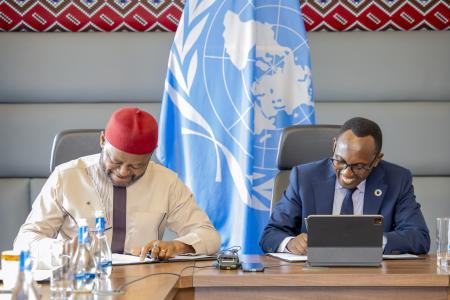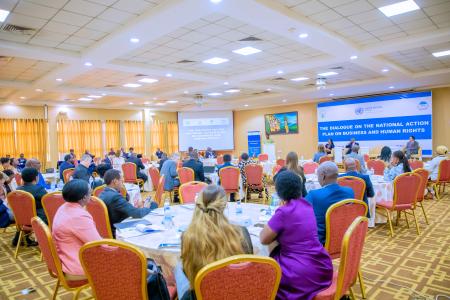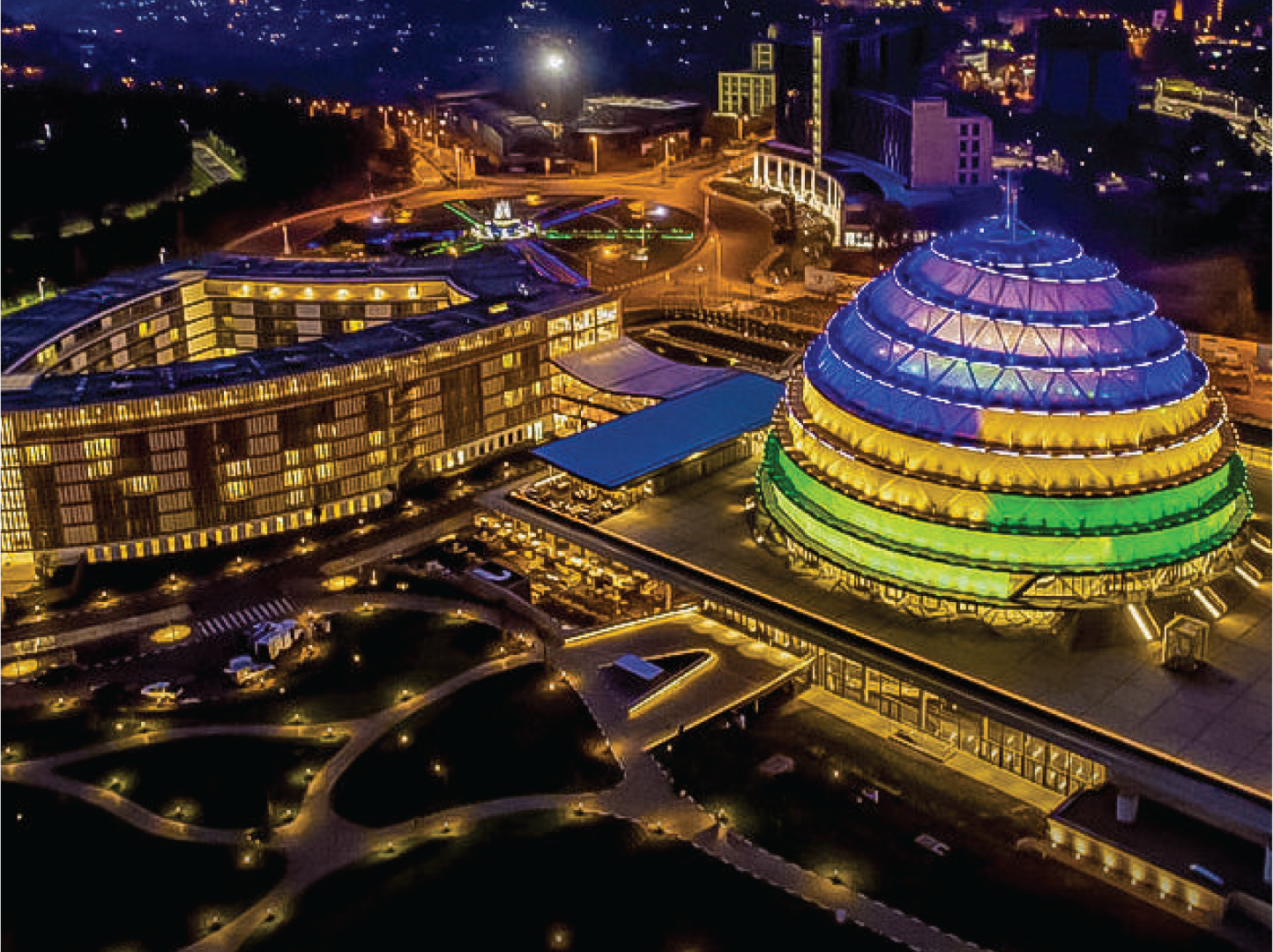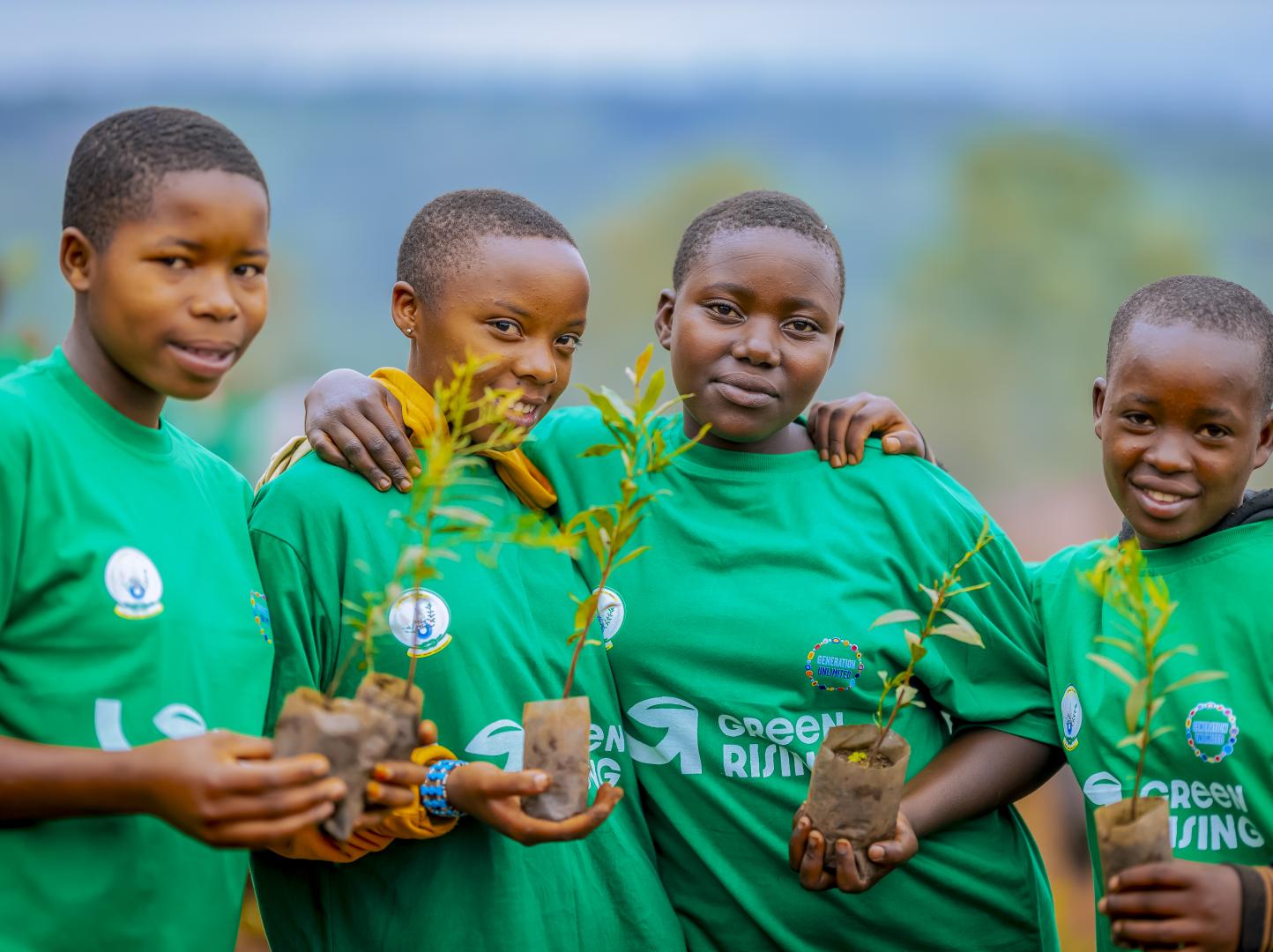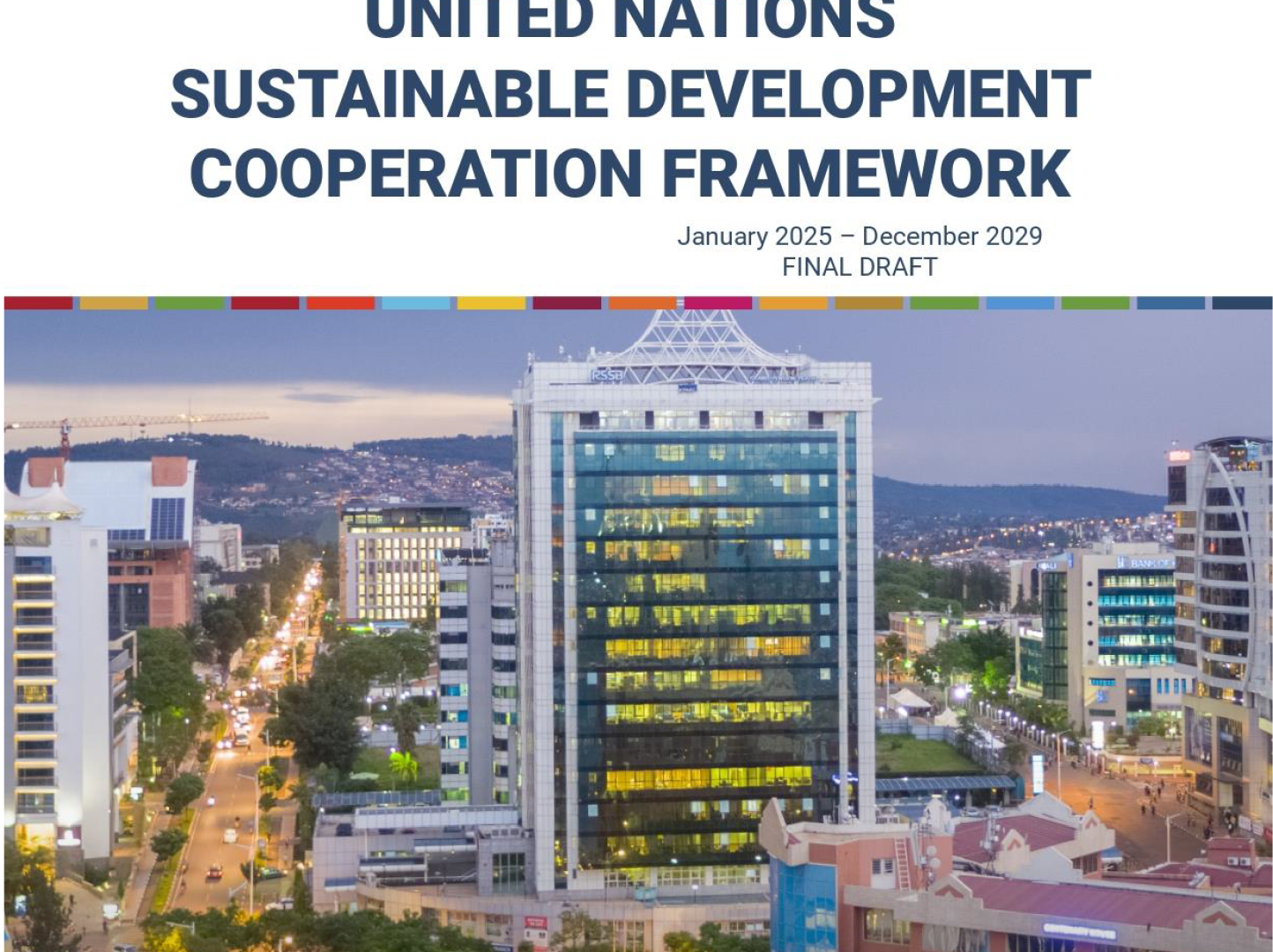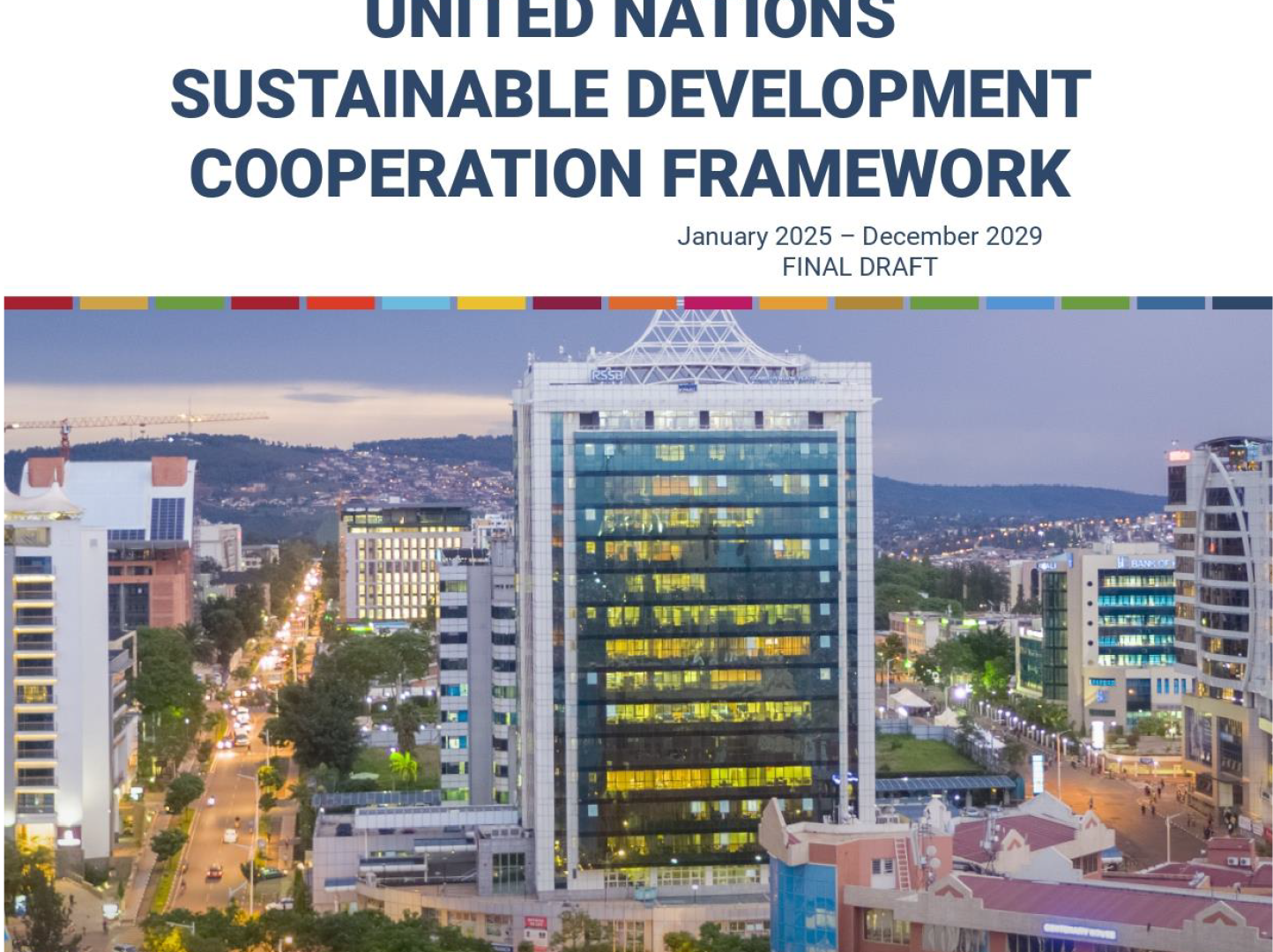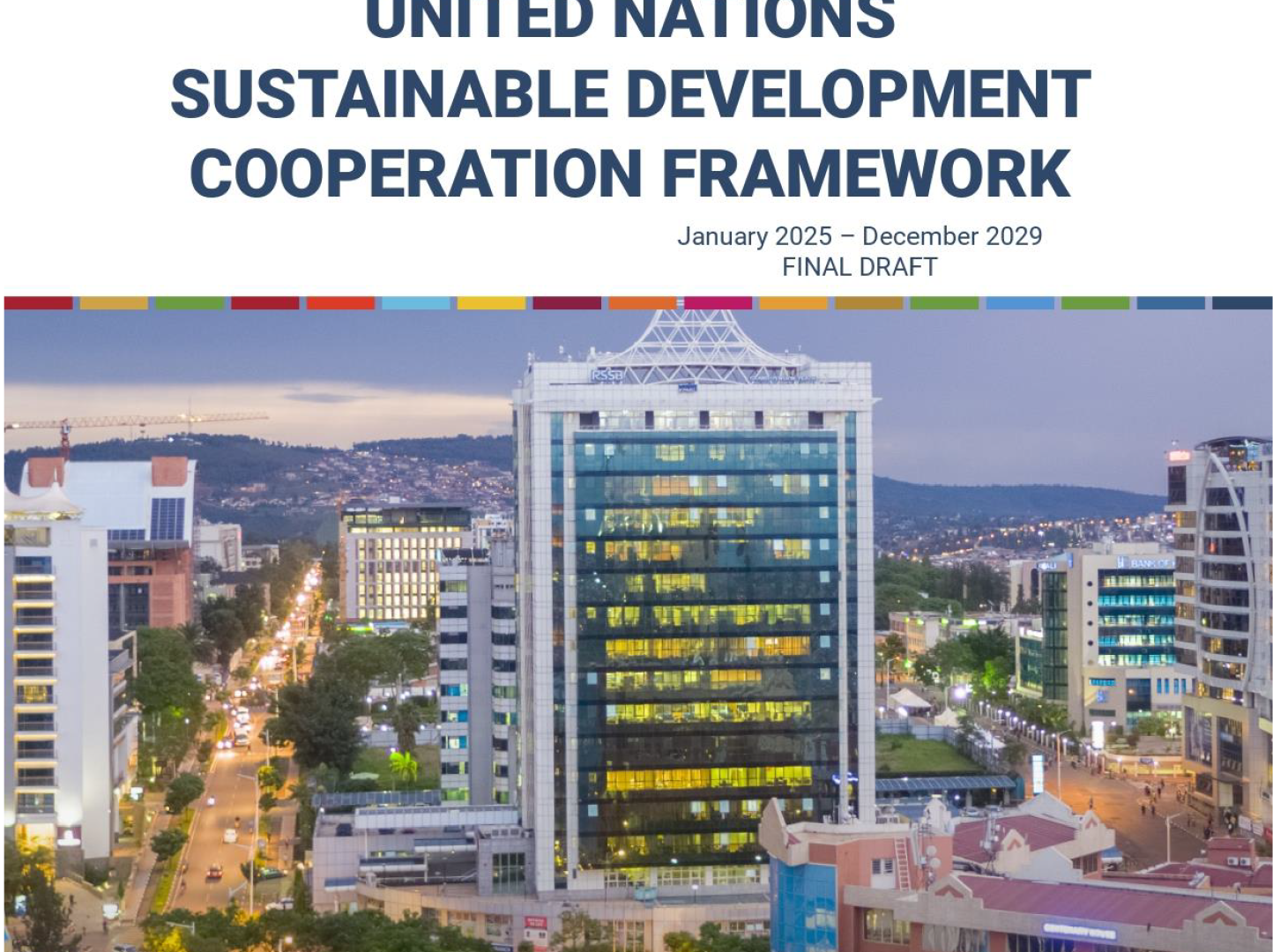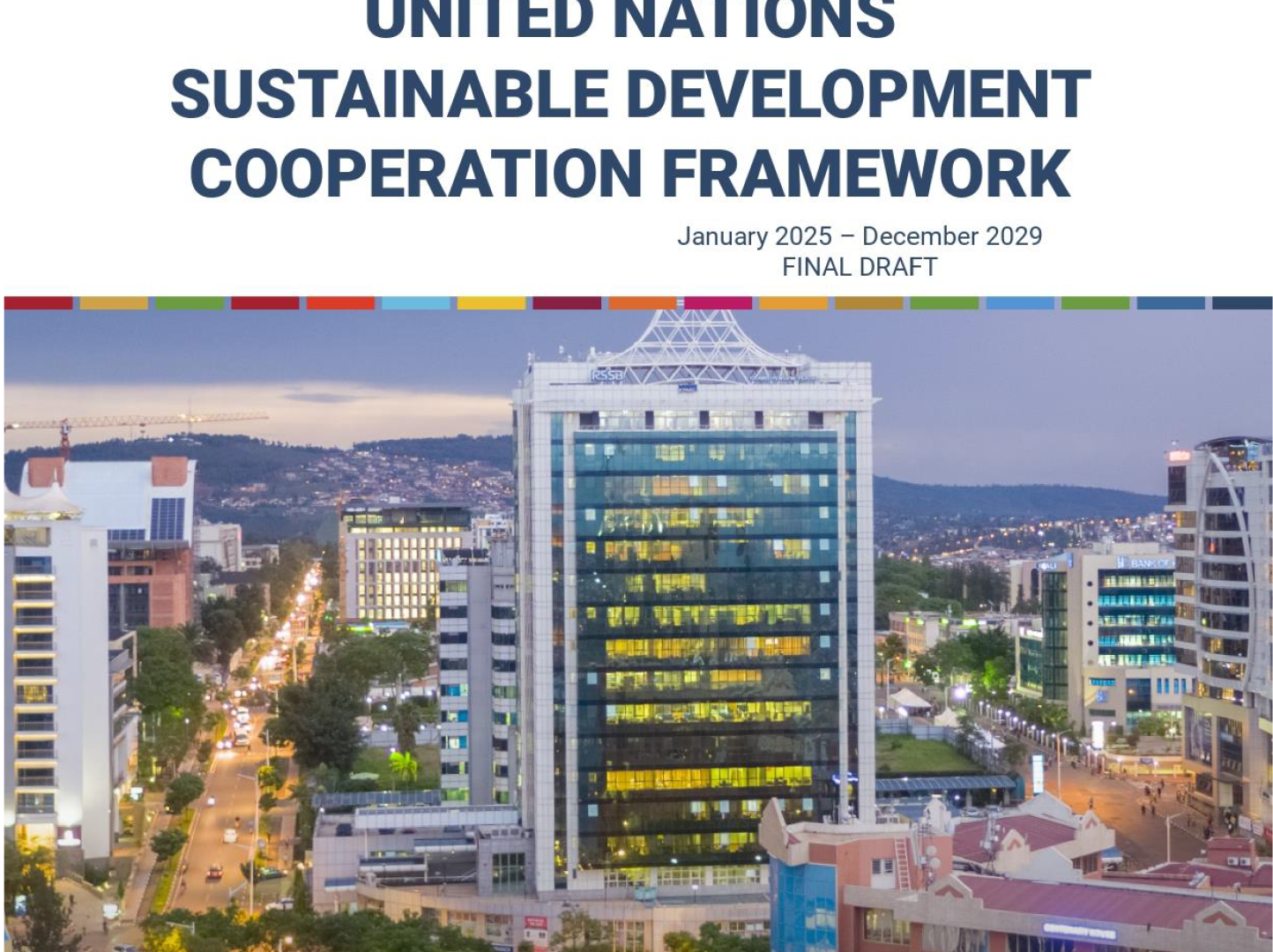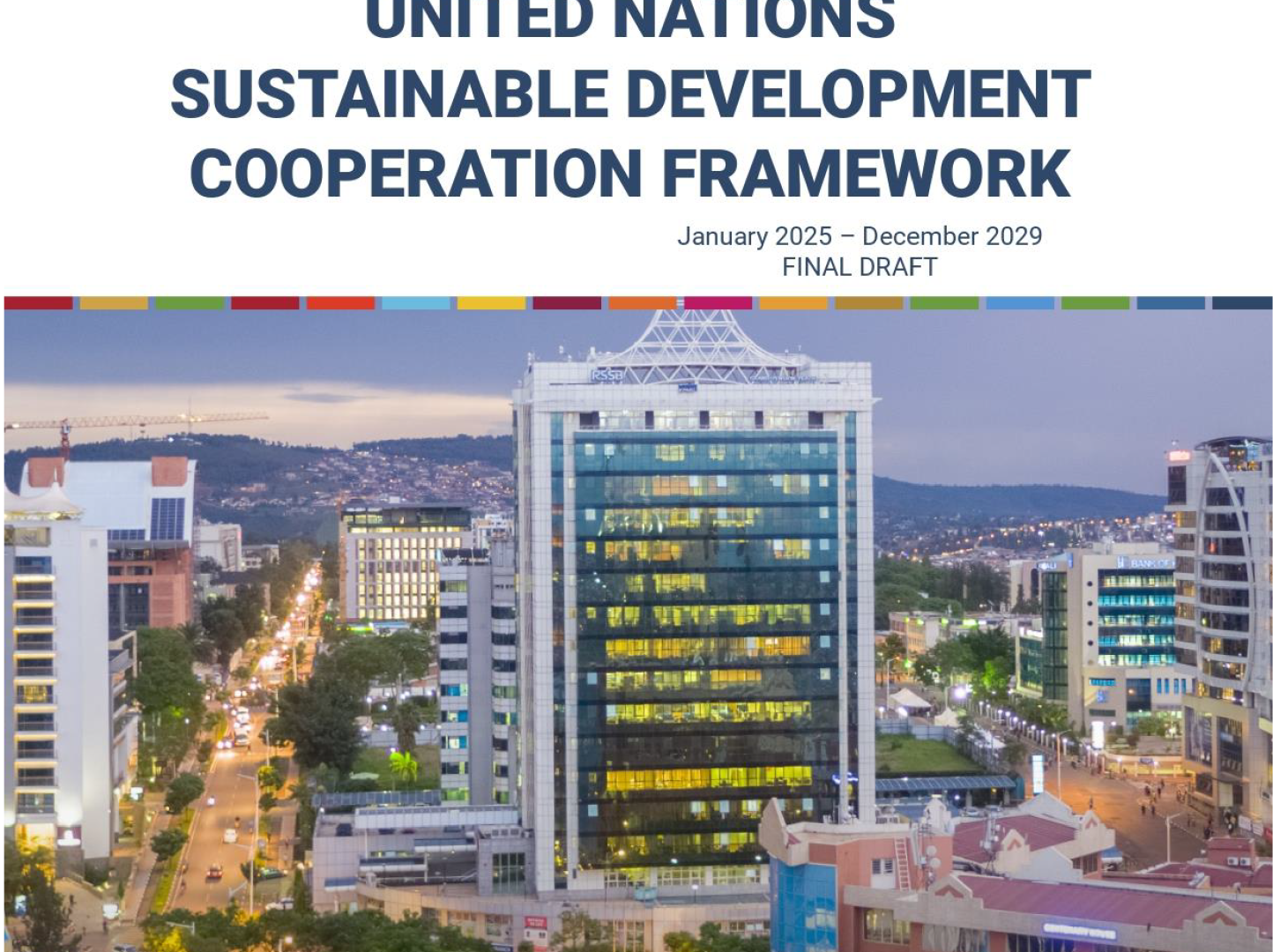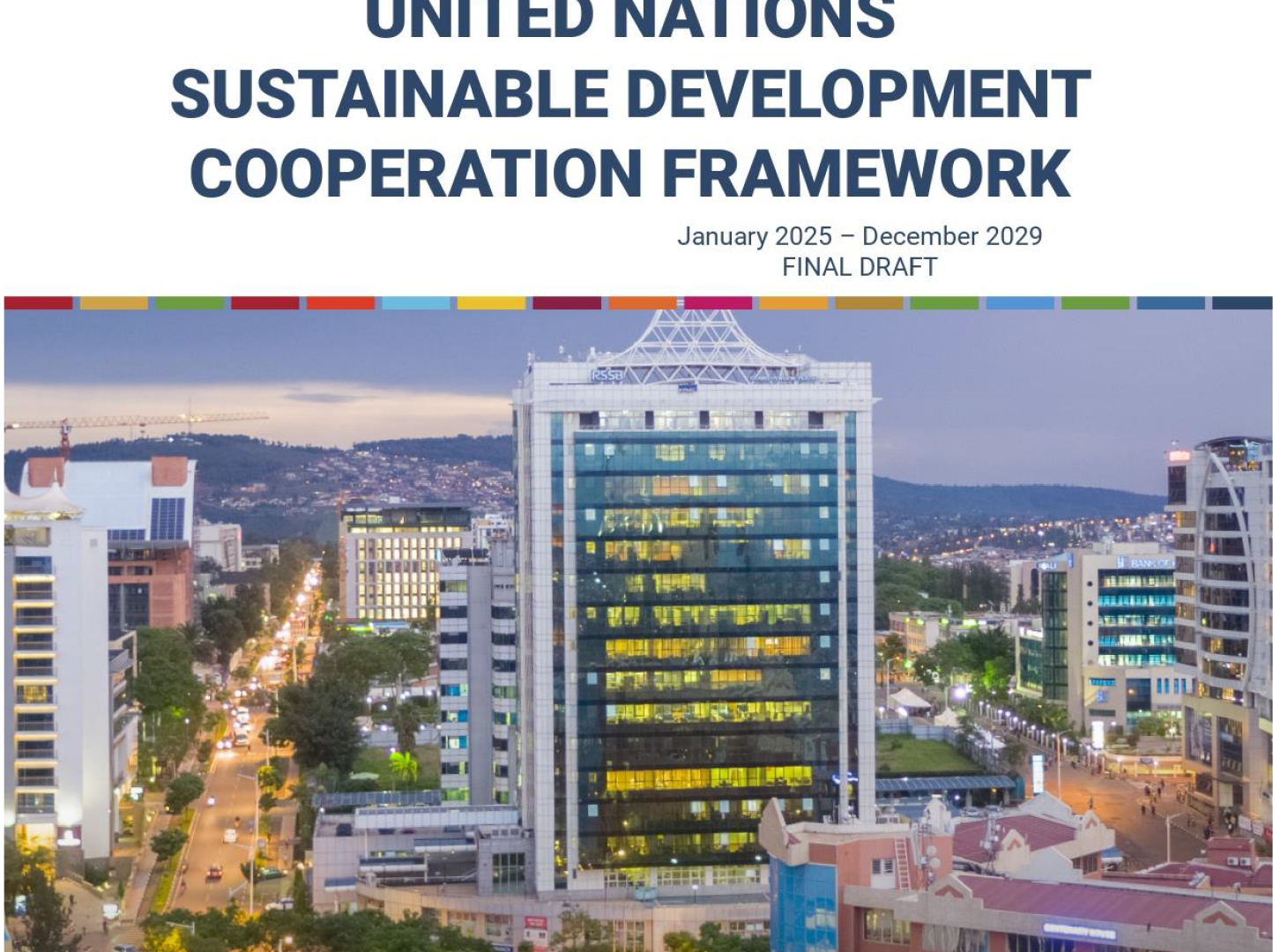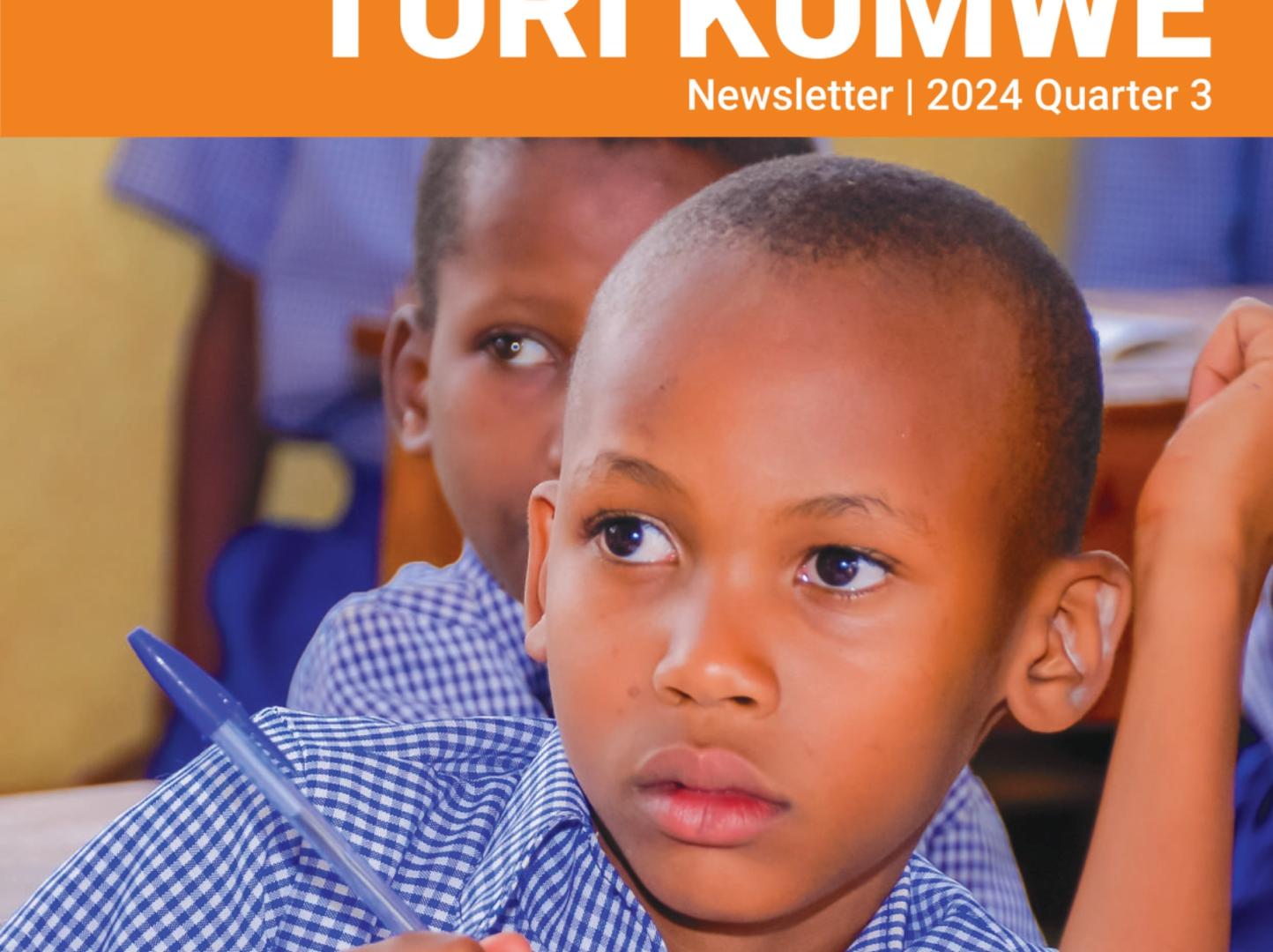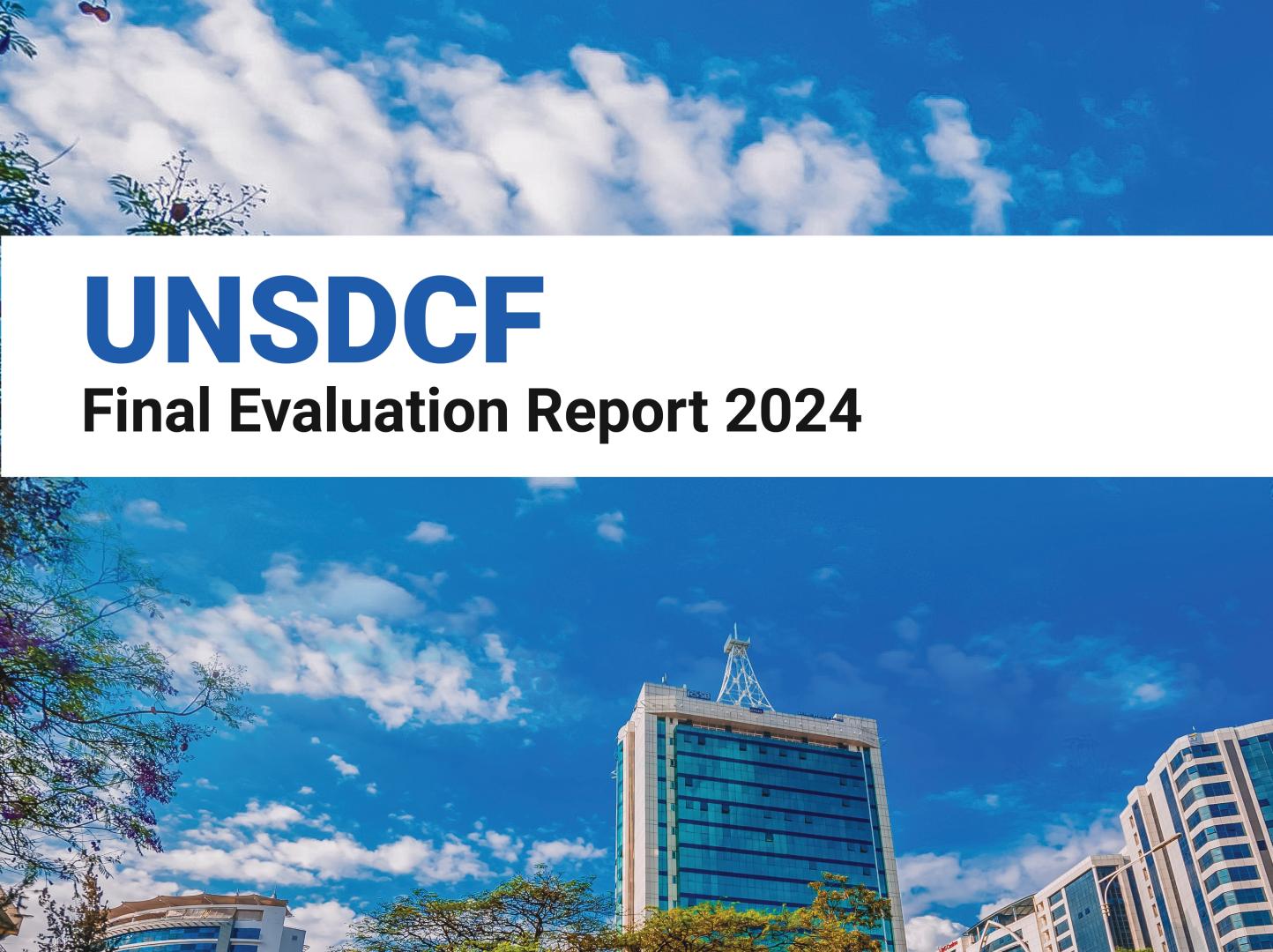Latest
Story
28 May 2025
A Thousand Health Posts, A Thousand Hopes: UN Rwanda and I&M Bank Commence a Revolutionary Pathway towards Universal Health Coverage
Learn more
Press Release
20 May 2025
UN expert on poverty to visit Rwanda
Learn more
Video
07 April 2025
UN Rwanda's key Achievements 2023-2024
Learn more
Latest
The Sustainable Development Goals in Rwanda
The Sustainable Development Goals are a global call to action to end poverty, protect the earth’s environment and climate, and ensure that people everywhere can enjoy peace and prosperity. These are the goals the UN is working on in Rwanda:
Story
05 January 2024
Boukuru’s performance at Flytime Fest in Nigeria: A great steppingstone to her carrier
Christine Uwase Boukuru a young Rwanda vocalist found herself in Nigeria, ready to perform for the very first time in her career on the global scene. It was a dream come true for her, as she had always admired the vibrant music scene not only in Africa but on an international level.
As she stepped onto the stage, she couldn't help but feel a mix of nerves and excitement. Little did she know that she would be sharing the stage with big icons like the famous David Adedeji Adeleke OON, who is professionally known as Davido among others.
Boukuru’s performance in Nigeria was an immediate result emanating from the partnership between the government of Rwanda through the Ministry of Youth and Arts, Imbuto Foundation, and the United Nations in Rwanda to promote the creative industry.
“This was a dream come true and life-uplifting to me. I made a lot of connections and recorded three songs with Nigerian artists that will be released soon” the excited Boukuru narrated.
As the lights dimmed and the music began, she took a deep breath and let her voice soar. Her soulful melodies filled the air, captivating the audience from the very first note. The crowd was mesmerized by her unique blend of African rhythms and heartfelt lyrics, swaying to the beat and singing along.
The young artist's performance was met with thunderous applause and cheers. The audience recognized her raw talent and the authenticity she brought to her music. It was a proud moment for her, representing not only Rwanda but also the power of music to transcend borders and unite people from different cultures.
“Upcoming artists will always need opportunities like. We need to collaborate with other famous artists to grow our talents thank you the government of Rwanda and UN Rwanda for this opportunity I got”,
The experience had not only elevated her artistry but also broadened her horizons. She was now more inspired than ever to explore new sounds, collaborate with artists from diverse backgrounds, and use her music as a tool for positive change.
1 of 5

Story
21 December 2023
UN Day X Spaces: Delivering Equality, Justice and Freedom for Migrants
In marking the 79th Anniversary of the United Nations, International Organization for Migration (IOM) in Rwanda, the UN held a public Dialogue to shed light on the crucial role of delivering equality, justice, and freedom for individuals on the move. The Dialogue which took place on X space, stressed the importance of affording migrants equal access to services and opportunities, recognising their fundamental rights.
A notable example highlighted during the discussion was IOM's efforts in skills development through collaboration with the Rwandan diaspora living abroad. Individuals from the diaspora engage in short assignments in Rwanda, sharing their expertise to contribute to the skills development and knowledge transfer of the local population.
One example is Jean Claude. He moved to Belgium in 2006 to earn a Bachelor’s degree in Electronics. Upon completing the course, he quickly started a thriving career as a railway technology specialist. When 17 years into his Belgian chapter, Jean Claude heard about an opportunity to travel back to Rwanda to share his skills, he did not hesitate to sign up for the programme.
"Wherever Rwandans go, they are exposed to new technologies and knowledge. There is nobody better to bring it back to Rwanda than us."
The discourse on X space, underscored the significance of access to justice as a fundamental right for migrants, emphasizing its essential role as a prerequisite for the realisation of all other rights. This is particularly crucial in ensuring the labor rights of migrants from other countries are respected.
Moreover, the conversation acknowledged migration as an inherent expression of freedom. Rwanda's approach to managing migration was commended, citing policies and measures such as the registration of third national countries, open-visa policies, open-for-business policies, and free movement for East African Community (EAC) nationals. Notably, Rwanda was the first country to ratify the AU Free Movement Protocol of the AfCFTA, being one of only four countries to do so.
"Everybody deserves access to services, including migrants. While skills are widely distributed, opportunities are not," asserted Ash Carl, Chief of Mission for IOM Rwanda. "We work with Rwandans residing overseas to explore how they can transfer those skills back to their home country."
Migration is a cross-cutting issue in the 2030 Agenda, relevant to all of the Sustainable Development Goals (SDGs). Further, the SDG’s motto to “leave no one behind” is a clear call for sustainable development to be inclusive, including for migrants. At least ten out of 17 goals contain targets and indicators that are directly relevant to migration or mobility. Ensuring equality, justice, and freedom for migrants is not only a moral imperative but also a fundamental commitment to building inclusive societies, fostering global harmony, and unlocking the full potential of diverse contributions to collective progress.
1 of 5
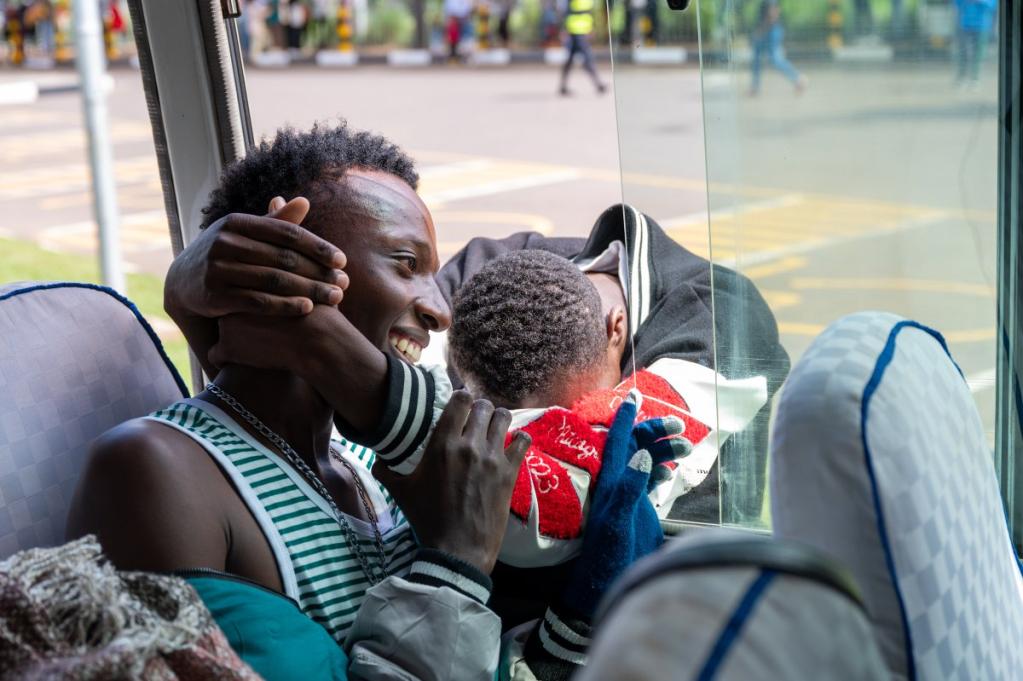
Story
20 December 2023
Fostering Creativity: Rwanda and Nigerian Creative Industry experts to forge strategic partnerships.
In alignment with Rwanda's dedicated commitment to nurturing its creative industry and empowering its youth, as underscored during the UN Deputy Secretary-General's visit to Art Rwanda Ubuhanzi on the sidelines of the 2022 Commonwealth Heads of Government Meeting in Kigali, a collaborative effort has been initiated. UN Rwanda, Imbuto Foundation, the Ministry of Youth and Arts, and the Ministry of National Unity and Civic Engagement (MINUBUMWE) are jointly shaping the 'Unleashing the Potential of Youth through Creative Industry in Rwanda' Joint Programme.
This comprehensive initiative aims to equip Rwandan youth with essential skills and knowledge to establish sustainable creative enterprises, promoting innovation, professionalism, and inclusivity within the creative economy.
Additionally, it seeks to foster collaboration and network-building between the creative industries of Rwanda and Nigeria. As a part of this initiative, Rwanda hosted a delegation of six experts from Nigeria to assess progress, opportunities, and challenges within the Culture and Creative Sector.
Rwandan and Nigerian creative industry experts are set to chart a new path to create a platform for collaboration and partnership in a new move to promote and strengthen the foundations of their respective creative landscapes.
The first step happened after the productive visit by Nigerian icons to Rwanda where they held several engagements with Rwandan government officials, United Nations Rwanda, and the local industry practitioners and experts.
This partnership will mark a significant step toward nurturing cross-cultural exchanges, promoting talent, and unleashing the untapped potential of the African creative sector that is envisaged to create more job opportunities, especially among the African youth.
Adebola Williams Chairperson of AWNetwork and founder of MITTA Centre who led the delegation of the Nigerian’s icons expressed the willingness and eagerness to strategize on the new channels to enhance partnership.
“This sector has a huge potential and we want to come up with a roadmap that will help either catalyze or accelerate the creative economy to create jobs for young people, to protect their Intellectual Property, to upskill their capacity, share knowledge, and build structures that help them be their most effective experts”, Adebola said.
According to Ozonnia Ojielo the UN Resident Coordinator in Rwanda, the impact of the partnership between the Rwandan and Nigerian creative industry sectors extends far beyond the realms of art and culture underlining that it has the potential to be a catalyst for economic development, cultural exchange, and the empowerment of a new generation of African creatives, ultimately reshaping perceptions and elevating the global standing of African creativity.
He further mentioned that nurturing emerging talent will empower young creatives in both nations. “I’m optimistic that expertise from experienced professionals will lead to the development of a highly skilled and innovative new generation within the creative industries and as United Nations in Rwanda, we will continue providing our support and ensure this vision is realized”,
In an exclusive interview with the Hon. Sandrine Umutoni State Minister for Youth, she noted that through strategic partnerships with different stakeholders and partners, the ministry has come up with initiatives that have positively impacted the young generation.
“We have been discussing with partners to come up with a good strategy on how to empower our young people both educated and not educated, especially through the creative industry. The creative economy has the potential to not only increase the GDP of the country or at a global level but also bring together young people around the massages of unity, and resilience”.
She cited ArtRwanda-Ubuhanzi a televised nationwide talent search project implemented by the Imbuto Foundation in collaboration with the Ministry of Youth since 2018. The project identifies and supports young and talented Rwandans within the creative arts industry in nine different categories (Film making, Photography, Digital Art, Acting and drama, Dance, Fashion Design, Music, Literature, Visual and Plastic Arts).
During the discussion, H.E Robert Masozera, Director General of Rwanda Cultural Heritage Academy welcomed the anticipated partnership adding that this will open new doors for Rwandan creative experts to the international heights.
“We want to expand Rwanda’s creative economy. We are excited about learning from these Nigerian experienced icons”, He noted.
The Ambassador further observed that Nigeria's creative sector is more developed adding that this was a great opportunity for the local industry to share experiences and learn from their Nigerian counterparts as this will move the Rwandan creative industry to another level.
The Nigerian icons and members of MITTA Centre Creative Experts Council who were in Rwanda include Bada Akintunde Johnson the Country Manager of Paramount Africa, Moses Babatope G.E.D. Film House Cinemas, Osas Ighodaro Actress and Producer, Richard Mofe Damijo Actor and Executive Producer, Cecil Hammond CEO of Flytime Group, and Adebola Williams Chairperson of AWNetwork who was leading the delegation.
As a direct outcome of the visit, the MITTA Centre extended an exclusive invitation to Ms. Christiane Bukuru Uwase, a talented Rwandan musician who engaged with the Nigerian Icons during their visit. She showcased her exceptional talents at the prestigious FLYTIME FEST 2023, which took place in Lagos from December 21st to December 26th, 2023.
This performance marked a historic moment as Ms. Bukuru became the first-ever Rwandan artist to grace the stage at Flytime Fest, representing a remarkable opportunity seized!
The creative economy contributes to the achievement of the broader objectives of the 2030 Agenda, with emphasis on the quality of life and well-being as a key outcome of a targeted economic process and It aligns with a variety of Sustainable Development Goals (SDGs), especially the quality education, gender equality, decent work and economic growth and Industry, Innovation, and infrastructure.
1 of 5
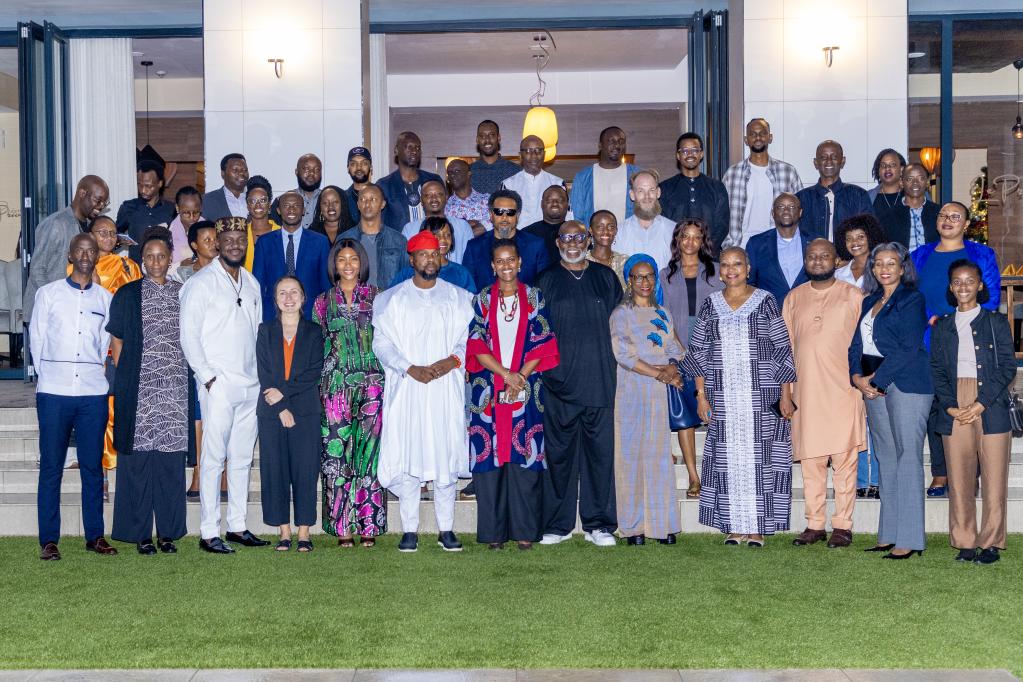
Story
15 December 2023
Government and One UN Rwanda assess the impact of collaborative efforts toward achieving the country’s development agenda
The Minister of Finance and Economic Planning Dr. Uzziel Ndagijimana and the United Nations Resident Coordinator to Rwanda Mr. Ozonnia Ojielo chaired the 2023 One UN Steering Committee to assess the impact of the joint efforts aimed at achieving the Rwanda development agenda.
The One UN Steering Committee Meeting is an essential time to review and reflect on the progress that the UN system has made in the implementation of the United Nations Development Assistance Plan Two (UNDAP II) which is fully aligned with the National Strategy for Transformation One (NST1).
The high-level gathering attracted government cabinet ministers from different sectors, Heads of UN Agencies in Rwanda, development partners, Civil society representatives, and Mr. Achim Steiner the UNDP Administrator who was on an official visit to Rwanda.
While officially opening the meeting, Minister Dr. Uzziel Ndagijimana underscored the significance of the meeting mentioning that it is a re-affirmation of the Government of Rwanda’s commitment to Delivering as One Initiative or the “One UN” as commonly referred to, since 2007 when Rwanda became among the eight pilot countries with the main objective of strengthening the effectiveness and coherence of the UN at the country level.
“The UN has been fully aligning its interventions with our medium to longer-term development strategies through the UNDAP with the Leadership of the UN Resident Coordinator. Today we have the opportunity to review, assess, and commit ourselves to act together with the main purpose of ensuring that the One UN becomes a reality in Rwanda which I am sure can be replicated elsewhere in the World”. He said.
Minister further mentioned that as the government focuses on achieving the targets in the remaining period of NST1 and preparation for the successor program “we will count on the UN’s collaboration in this Journey and I believe that our Meeting today is relevant for this reason”.
Through various agencies and the Resident Coordinator's office, the United Nations plays a crucial role in supporting Rwanda's socioeconomic development through a variety of programs and initiatives, especially in different areas like poverty reduction and economic development, health, education, youth, gender equality and women empowerment, environmental sustainability, and good governance among others.
The UNDP Administrator Mr. Achim Steiner who attended the conversation hailed Rwanda's resilience in advancing the country’s social-economic development and good governance pledging for more collaboration and support to the Country's development agenda.
“We feel very privileged as UNDP to have been a long-time companion to Rwanda in its various development phases and journeys that it has embarked on. UNDP has a very broad set of engagements across governance, the justice sector, and digital, but also green transitions and innovations. Very often, we are not just an institution that implements one programme. He said.
Participants discussed several key topics, including the upcoming new National Strategy for Transformation2, financing needs, boosting public and private, domestic and external financing, and the Future Drivers of Growth especially how development cooperation can support these growth drivers to accelerate their ability to contribute to Rwanda’s transformative agenda.
Mr. Ozonnia Ojielo the UN Resident Coordinator in Rwanda commended the government’s visionary leadership adding that it was indeed imperative for all partners to continue working together for the country to achieve its sustainable goals and development agenda.
“How do we move away from project focus to program focus? how do we give space to the development partners, civil society, and the government to collaborate and work together in the implementation of these decisions”.
1 of 5

Story
07 February 2024
Peace and Security at the table as regional countries convene under UNSAC
Creating and sustaining peace and security in the Great Lakes region of Africa involves a comprehensive and collaborative approach, addressing both immediate and underlying causes of conflicts. This was at the center of the discussion during the 56th Ministerial Meeting of the United Nations Standing Advisory Committee on Security Questions in Central Africa (UNSAC) hosted by Rwanda
The five-day gathering convened foreign ministers and experts from 11 member countries of the Economic Community of Central African States (ECCAS) to assess various topics focusing on security and stability issues in the region.
The United Nations Special Representative of the Secretary-General for Children and Armed Conflict (SRSG CAAC), Ms. Virginia Gamba, called on member countries to prioritize the issue of shielding children in conflicted areas as a vital aspect of human rights protection.
She further observed that while the UN plays a significant role, it's important to note that addressing the complex issue of child protection in conflict zones requires the cooperation of governments, non-governmental organizations (NGOs), and the international community as a whole.
“We need to have a regional plan on how to prevent violations, improve communications between borders, improve border controls, and improve how to handle children who are released from the conflicts so they can be reintegrated safely back into communities”, she said during the exclusive interview with the UNRCO communications team.
The UN Leader commended the meeting mentioning that though it was generally focusing on human rights protection, it was also a great opportunity to advocate for children suffering in the conflicted zones in the region particularly girls who are raped by terrorists and armed groups.
During this meeting, Rwanda was elected to chair the Bureau of the United Nations Standing Advisory Committee on Security Questions in Central Africa for the next 6 months.
In his remarks, Rwanda’s foreign affairs Minister H.E Vincent Biruta called for joint efforts to address regional security issues. He stated that Central Africa is facing numerous security threats, ranging from the problem of small arms to questions linked to migration crises, climate change, terrorism, extremism, and unconstitutional changes, among others.
Minister Biruta further emphasized the need to identify and adopt coherent strategies to counter all potential threats to the stability of the sub-region while reiterating Rwanda’s commitment to achieving the goal.
“I hope this meeting will give new impetus to the search for solutions to the security challenges facing our sub-region. I would also like to reiterate Rwanda's willingness to work with each of you to achieve this goal,” he highlighted.
UNSAC was established on 28 May 1992 by the Secretary-General of the United Nations, under Resolution 46/37 B adopted on 6 December 1991 by the UN General Assembly. The decision was to have a positive response to the request made on 28 November 1986 by the member countries of the Economic Community of Central African States (ECCAS) emphasizing the need to create this Committee
🎥🔴 Link to the interview: https://www.youtube.com/watch?v=sKXtLf8NZrg&ab_channel=OneUNRwanda
1 of 5
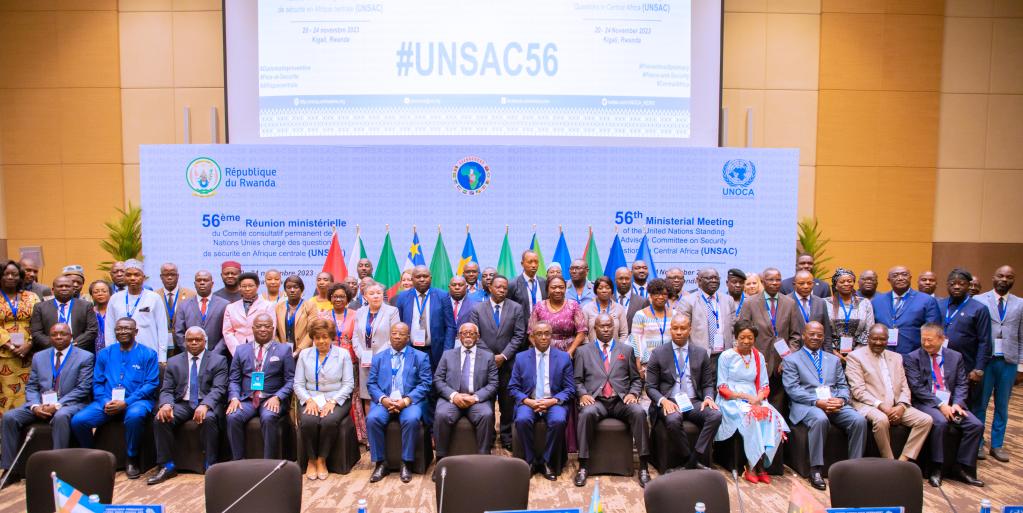
Story
28 May 2025
A Thousand Health Posts, A Thousand Hopes: UN Rwanda and I&M Bank Commence a Revolutionary Pathway towards Universal Health Coverage
The United Nations and I&M Bank have collaborated to develop a groundbreaking initiative toward universal health coverage. This strategic partnership, formalized through signing a Memorandum of Understanding (MoU), is a powerful UN-private sector partnership to clear the way for Rwanda's push towards equitable and affordable healthcare for all.At the center of this partnership is the joint program titled "A Thousand Health Posts in the Land of a Thousand Hills"–a program that embodies the spirit of the Sustainable Development Goals (SDGs) and responds directly to the appeal for inclusive health systems expressed in UN General Assembly resolutions. Technical leadership is being provided by the United Nations Population Fund (UNFPA) in collaboration with other UN agencies including UNCDF, UNDP, WHO, UNICEF, UNHCR and UN-Habitat. It aims to transform rural health infrastructure by putting in place 1,000 community-based health posts within the country. What sets this partnership apart is that it is leveraging private sector innovation to spur public good. Under the agreement, UN Rwanda, through UNCDF, will deploy a de-risking mechanism—a form of partial credit risk guarantee—to enhance access to capital for nurse entrepreneurs operating these health posts. Concurrently, I&M Bank will provide affordable financial solutions to these health providers, supplemented with capacity-building in business management and financial literacy. “We are excited to partner with I&M Bank Rwanda to scale up community health solutions that are people-centered and sustainable,” Noted Mr. Ozonnia Ojielo, the UN Resident Coordinator in Rwanda. “This collaboration exemplifies how the UN and the private sector can work hand in hand to accelerate progress toward universal health coverage, leaving no one behind.” "This partnership reflects our belief that sustainable health outcomes require innovative financing solutions and deep collaboration,” said Benjamin Mutimura, CEO of I&M Bank (Rwanda) Plc. “We are proud to play a catalytic role in enabling health post operators to thrive and reach the communities that need them most.”Apart from financing, the MoU formalizes shared values of accountability, integrity and zero tolerance for abuse or exploitation. It reaffirms a shared commitment to ethical programming, as well as to advancing human rights, in a way that respects all parties involved, from partners to communities.In conformity with Rwanda's National Strategy for Transformation (NST2) and the global 2030 Agenda for Sustainable Development, this partnership embodies the UN's unshakeable resolve to sustainability in action and not just in words. It also embodies the rising leadership of the private sector as a close ally in confronting complex social challenges—anything from health equity to economic resilience. By 2026, the project will reach over 2 million individuals, showing that where vision and collaboration meet, the result is revolutionary. Empowering nurse business leaders as changemakers, this initiative does not just provide healthcare—it builds community resilience, empowers women in leadership and brings Rwanda closer to a future in which no one is left behind. This isn't just a memorandum. It's a movement—toward health, hope, and humanity!
1 of 5
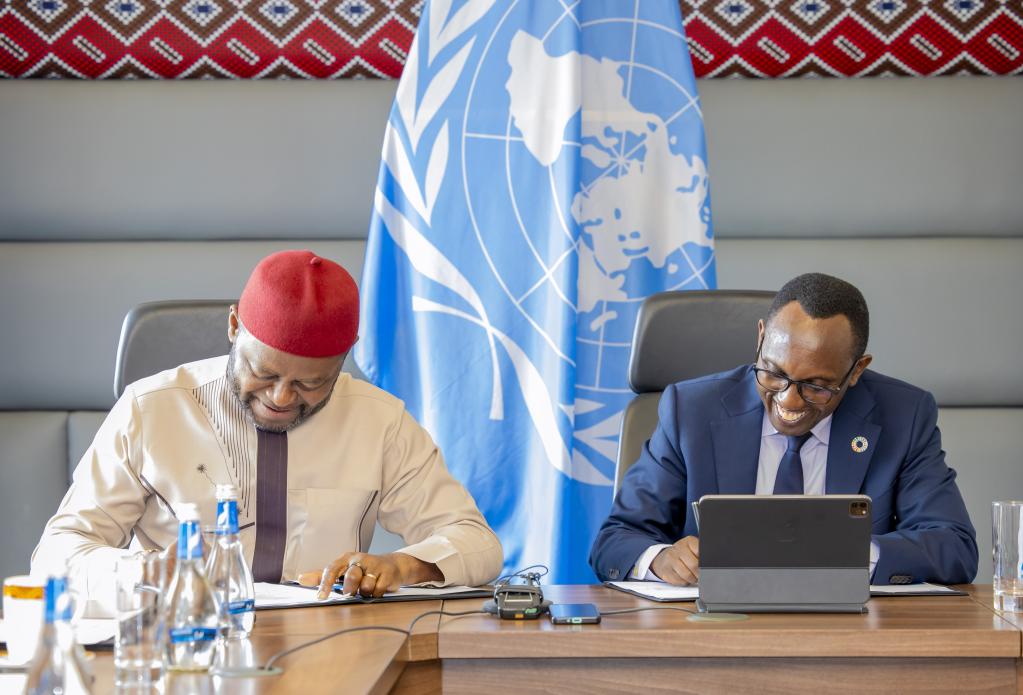
Story
16 December 2024
Strengthening Partnerships for Rwanda’s Transformation: Annual Government–UN Joint Steering Committee Convenes in Kigali
The Annual Government–UN Joint Steering Committee (JSC) convened today, Monday, 16th December 2024, bringing together high-level officials from the Government of Rwanda, the UN System, Development Partners, the Private Sector, Civil Society, and other stakeholders. This pivotal annual meeting, chaired by Honourable Yusuf Murangwa, Minister of Finance and Economic Planning, and co-chaired by Mr. Ozonnia Ojielo, UN Resident Coordinator, served as a platform to review progress and renew commitments to supporting Rwanda’s sustainable development priorities.In his opening remarks, Honourable Yusuf Murangwa underscored the importance of aligning efforts to achieve shared goals: “The One UN Steering Committee Meeting reaffirms our commitment to strengthening coherence, innovation, and collaboration. The success of Rwanda’s transformative agenda lies in our ability to deliver results as one cohesive team, with the Government, UN agencies, and Development Partners working hand in hand.”The meeting focused on the transition to the newly elaborated UN Sustainable Development Cooperation Framework (UNSDCF), which is designed to advance Rwanda’s Vision 2050, the National Strategy for Transformation Phase Two (NST2), and global commitments, including the SDGs and AU Agenda 2063. With a budget of approximately $1.04 billion, the UNSDCF is structured around three pillars: Economic Transformation, Social Transformation, and Transformational Governance.“This new Cooperation Framework has three outcomes, reduced from six in the previous framework, and six outputs, down from the 25 we had before. This demonstrates our commitment to removing individual hats and wearing one unified hat of Delivering as One—joining efforts and rallying behind Rwanda’s success in achieving its development aspirations,” said Angela Zeleza, Head of the Office of the UN Resident Coordinator, while presenting the new Cooperation Framework.Participants also viewed an animated video showcasing cumulative results achieved by the United Nations System in Rwanda of the outgoing CF. These results were highly appreciated by participants as a meaningful reflection for informing decision-making and development interventions going forward.“It is critically important to appraise data with the realities of how people’s lives are being improved on the ground,” stated Hon. Minister Maj Gen (Rtd) Albert Murasira, who participated in the meeting. He commended the ongoing collaboration with the UN system, particularly in building resilience for refugees and addressing shocks and Disaster Risk Reduction and Management.Chairperson of the Rwanda Civil Society Platform, Theoneste Murangira, also commended the results presented: “We are extremely happy with the results showcased. Some of them were achieved with our support as Implementing Partners, while others benefitted us directly. We greatly appreciate that the United Nations involves civil society in these deliberations. Together, we can indeed make a greater impact,” he said.Mr. Ojielo, the UN Resident Coordinator, echoed these sentiments, describing the UNSDCF as a “partnership document.” He added, “Our job as the United Nations is an accompanying one—we stand firmly behind Rwanda’s aspirations, rallying for the country’s success.”Another key highlight of the Joint Steering Committee was the presentation of the Country Programme Documents (CPDs) for the UNICEF, UNDP, UNFPA, and the WFP Country Strategy Paper (CSP). These CPDs and CSP outline strategic initiatives for the 2025–2029 period, focusing on inclusive and sustainable development.The meeting concluded with optimism about the path forward, expressing confidence in the collective ability to deliver on development objectives, as well as noting the importance of maintaining momentum and adapting to evolving challenges for long-term success. “The discussions held today underscore the importance of partnerships, strategic thinking, and innovation in addressing development challenges while recognizing the complexities involved in coordination and execution,” Minister Yusuf Murangwa stated in his closing remarks.The Annual Joint Steering Committee reaffirmed its commitment to fostering inclusive partnerships among the Government, Development Partners, the private sector, civil society, and the UN system. This platform serves as a vital forum for dialogue and collaboration, enabling the strengthening of development work to deliver impactful results. Recognizing the contributions of all stakeholders, the Committee emphasized the shared responsibility of ensuring that no one is left behind.
1 of 5
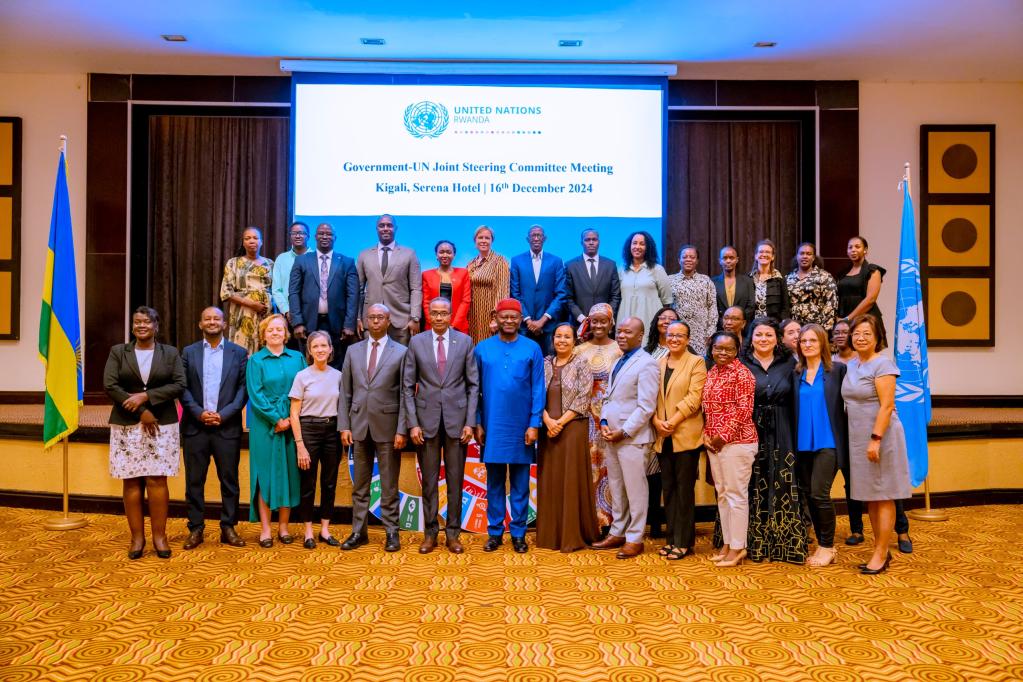
Story
12 December 2024
Celebrating Human Rights Day: Together Advancing Justice, Equality and a Better Future for All
Human Rights Day is a time to reflect on our shared humanity, the progress we have made in upholding human dignity, and the challenges that lie ahead. This year, Rwanda marked the occasion with a dual celebration: Human Rights Day and the 25th Anniversary of the National Human Rights Commission. The global theme, "Our Rights, Our Future," served as a guiding light for discussions on achievements, aspirations, and the path ahead.In his opening remarks, Ozonnia Ojielo, the United Nations Resident Coordinator in Rwanda, reminded participants that human rights monitoring is not a "beauty contest" to judge nations but a shared commitment to improving lives. “It is not about how ugly we look or how beautiful we look,” he remarked, underscoring the essence of human rights as a recognition of national aspirations and a tool for collective progress. He added that the Universal Periodic Review (UPR) process embodies these aspirations, encouraging stakeholders to continually work toward building a society where every citizen can take pride in their collective progress.Ojielo underscored the role of the United Nations in supporting Member States. “No UN Agency signed the Universal Declaration of Human Rights or any of the instruments. You signed as Member States,” he noted, emphasizing that global peace and security can only be achieved through complementarity. “Our role as the United Nations is serve as your housekeeper - to support, accompany and assist you in your journey.”Rwanda’s Achievements in Human RightsRwanda’s abolition of the death penalty on July 25, 2007, stands as a powerful testament to the country’s dedication to upholding human rights. Significant strides have also been made in areas such as healthcare, education, gender equality, and justice. This progress embodies what Ojielo referred to as "the logic of inclusivity," a cornerstone of Rwanda’s development model and its commitment to leaving no one behind.The Mo Ibrahim Foundation ranks Rwanda’s legal system as the third-best in Africa, a recognition of the country’s journey in strengthening the rule of law. However, as emphasized by Ojielo and other speakers, this achievement should be viewed as a milestone, not the final destination. “No state is perfect in realizing human rights,” Ojielo stated, calling for sustained collective efforts to advance human rights and governance.The Interconnection of Human Rights and Sustainable DevelopmentA key focus of the discussions was the intersection between human rights and the Sustainable Development Goals (SDGs). “Sometimes people assume that human rights are just about political issues,” Ojielo explained. “But the fundamental underpinning of human rights is the SDGs.” He elaborated on how the SDGs' pillars—people, prosperity, planet, peace, and partnerships— are intrinsically linked to social, economic, environmental, and political rights. By advancing the SDGs, nations simultaneously fulfill their human rights commitments, reinforcing the interconnectedness of these global frameworks. Reflecting on the FutureWhile celebrating progress, the event also provided a platform for reflection on emerging challenges. Providence Umurungi, Chairperson of the National Human Rights Commission, acknowledged the critical role of the UN and civil society in supporting Rwanda’s journey. “We are taking this opportunity to recognize the progress we have made, celebrate achievements, and reflect on challenges—not just as an institution but as a country. We truly value the continued fruitful partnership with the United Nations,” she said.Honorable Minister Dr. Emmanuel Ugirashebuja, Minister of Justice and Attorney General, highlighted the need to address the challenges posed by emerging technologies and artificial intelligence. “Do these instruments have the power to respond to problems that will emerge in the future?” he asked, emphasizing the importance of renewing collective efforts to uphold human rights in an ever-evolving world. His call to action reinforced the event’s focus on adapting human rights frameworks to meet future challenges effectively.A Collective Spirit for TransformationThe discussions highlighted the role of civil society, state actors, and international organizations in safeguarding and advancing human rights. Ojielo described civil society as the “early warning systems” of society, emphasizing their preventive role in addressing human rights violations. “This trinity of protection, transformation, and prevention is why we are all stakeholders,” he said.Looking ahead, the unwavering commitment to human rights remains paramount. As Ojielo aptly put it, “We are on a constant journey toward making it better. Human rights are a pathway to solutions—a critical framework for preventing, transforming, and protecting all of us in our societies.”As Rwanda and the world celebrate Human Rights Day, the message is clear: the journey of upholding human rights is ongoing. Upholding human rights is a continuous endeavour, requiring collaboration, introspection, and adaptability to address emerging challenges. Through collective effort, the aspiration for a more just, inclusive, and equitable society can become a reality.About Human Rights DayHuman Rights Day is observed annually on 10 December around the world. It commemorates the anniversary of one of the most groundbreaking global pledges: the Universal Declaration of Human Rights (UDHR). This landmark document enshrines the inalienable rights to which every human being is entitled—regardless of race, color, religion, sex, language, political or other opinion, national or social origin, property, birth, or any other status.The Declaration was proclaimed by the United Nations General Assembly in Paris on 10 December 1948 and, for the first time, set out fundamental human rights to be universally protected.Each year, partners come together to renew their commitment to better implement the principles of the Declaration. Its first article states: “All human beings are born free and equal in dignity and rights. They are endowed with reason and conscience and should act towards one another in a spirit of brotherhood.” This principle serves as the foundation for all initiatives undertaken by states to advance inclusive development.
1 of 5
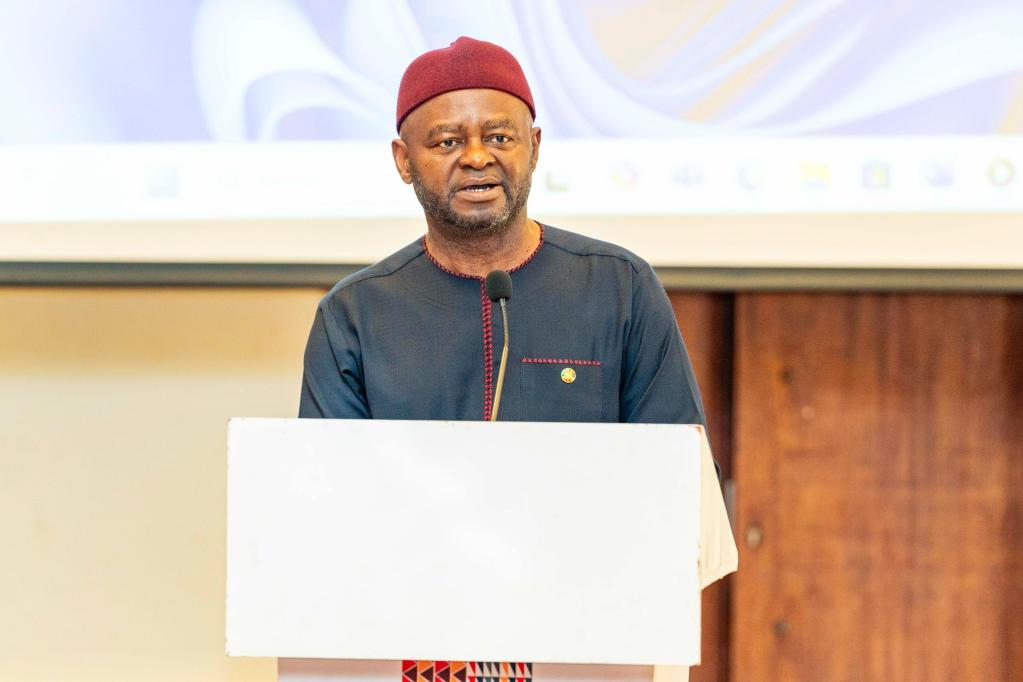
Story
04 December 2024
Shifting Focus: From Politics to Economics for Peace and Prosperity in Africa," Ozonnia urged participants at the Africa Trade Development Forum 2024
Peace, instability, and insecurity remain significant barriers to intra-African trade and are often cited by investors and traders as reasons for its slow growth. Concerns about inefficient infrastructure, both physical and digital, combined with conflicts, have hindered the free movement of people and goods critical for trade.Speaking at the Trade Development Forum, UN Resident Coordinator Ozonnia Ojielo challenged Africa's approach to these issues, emphasizing the need to shift focus from politics to economics as a foundation for peace and prosperity.“The sad reality is that right now, most of our countries are focusing on politics when they should be focusing on economics. The logic behind the European Union's integration is that, after warring with each other for hundreds of years, European countries recognized that fostering business partnerships and interdependence would not only end wars but also pave the way for lasting peace and regional integration. They were at war with each other until Europe realized that economics creates incentives and motivation for peace through joint investments. If we can do business together, we cannot hurt each other,” said Ojielo.The Forum moderated by Pascal Lamy, former Director-General of the WTO, featured a distinguished panel including Amb. Erastus Mwencha, Former Deputy Secretary-General of COMESA; Annette Mutaawe, Deputy Secretary-General of the EAC; Amb. Belén Calvo Uyarra, European Union Ambassador to Rwanda; and Jas Bedi, Chairman of the Kenya Export Promotion & Branding Agency.Intra-African Trade: A Sobering RealityDespite the launch of the African Continental Free Trade Area (AfCFTA) in January 2021, intra-African trade remains stagnant. According to the UN Economic Commission for Africa (UNECA), intra-African trade as a share of global trade dropped from 14.5% in 2021 to 13.7% in 2022. Exports within Africa also saw no improvement declining from 18.2% to 17. 9%, while imports hovered at 12.1% from 12.8%.“We’ve been discussing One-Stop Border Posts, but why don’t we aim for non-stop borders, allowing trucks to move seamlessly across borders?” questioned Amb. Mwencha, emphasizing the urgency for transformative solutions.Digitalization: The Key to Unlocking TradeDigitalization is a critical component of the AfCFTA and aligns with the African Union’s Digital Transformation Strategy for 2020–2030, which envisions a unified digital marketplace.Highlighting the potential of digital tools, Jas Bedi demonstrated the live session on the E-tariff book. “In seconds, the site shows that the tariff for tea from Kenya to South Africa, currently 240 cents per kilo, will be zero by 2030. Meanwhile, tea from outside Africa will continue to attract 400 cents per kilo. It’s working; it’s happening,” he said.During the Forum, UNECA presented recommendations for enhancing intra-African trade through digitalisation from the paper titled “Enhancing Intra-African Trade, Through Digitalisation From a Regulatory Perspective.” The key recommendations cited are:Harmonizing regulations on cross-border data transfer and adopting a continental-wide data protection framework.Cooperating on standards for digital trade, including certification, testing requirements, and encryption standards.Facilitating African firms' participation in public procurement beyond domestic markets.To date, promising digital tools making an impact include:Electronic Customs Systems: Faster border processing through real-time data exchanges.E-Certificates of Origin: Simplifying compliance with AfCFTA rules.Electronic Cargo Tracking Systems: Enhancing security and transparency in cross-border trade.“At a strategic level, the UN, through its Secretary-General and various organizations, is advocating against digital apartheid. The UN voice is becoming increasingly vital in this transformation,” reiterated Ojielo.Driving Africa’s Digital Trade RevolutionThe Trade Development Forum, co-hosted by the Rwandan Government and TradeMark Africa, was held in Kigali under the theme "Unlocking Africa’s Trade Potential through Digital Innovation." The event highlighted the transformative role of technology in connecting markets, empowering businesses, and driving inclusive economic growth; laying a strong foundation for advancing Africa’s prosperity and peace.
1 of 5
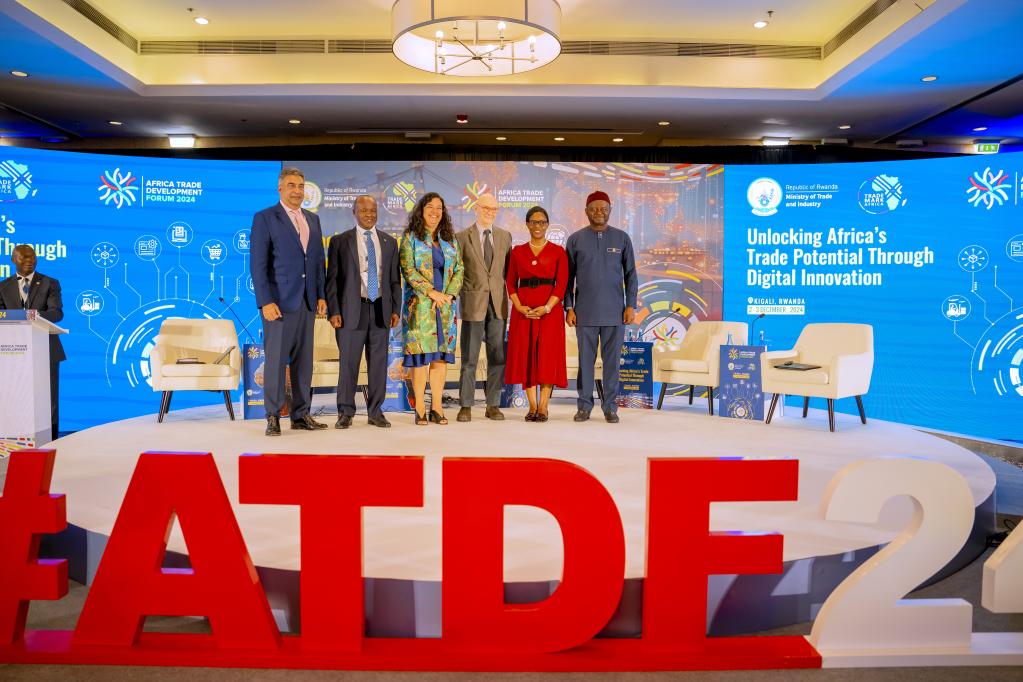
Story
14 November 2024
RCO Rwanda and DCO Convene Game-Changing Cooperation Framework Briefing with Regional Directors
Over 15 Regional Directors attended a thought-provoking briefing meeting on Wednesday, organized by the UN Resident Coordinator in Rwanda and DCO Africa. This was an important opportunity for the UN Country Team (UNCT) in Rwanda to present the status of the new Sustainable Development Cooperation Framework (UNSDCF) and share strategic asks with the Africa Regional Collaboration Platform for better coordination and synergy in delivering impactful results.Chaired by DCO Regional Director for Africa, Mr. Yacoub Ali El-Hillo, the meeting emphasized the critical need to break silos and enhance the UN’s strategic positioning.Breaking Silos for Greater Impact“This is an opportunity to interact and strategize how we can better position ourselves to support Rwanda’s priorities. I had an opportunity to attend the UNCT Rwanda retreat a couple of months ago, and the message from the Rwandan government was crystal clear: they expect the UN to move beyond a scattered, tiny project-based approach and instead operate in synergy, truly integrated at scale, to deliver bigger and more meaningful impact. That is why this conversation is very important for Regional Directors and UNCT members to fully align interventions as you implement the new Cooperation Framework,” said Mr. El-Hillo.Rwanda’s Socio-Economic Development: Resilience Amidst ChallengesRwanda’s economic and social progress continues to be remarkable, showcasing resilience and growth even after the disruptions caused by the COVID-19 pandemic. The economy rebounded strongly, achieving 10.9% GDP growth in 2021, and stabilized at 8% by 2023—well above regional averages. Key sectors driving this growth include services, construction, and manufacturing, with notable advancements in technology and food crop recovery. The projected growth for 2024 remains strong at 8.3%, despite potential risks such as the Marburg Virus Disease.Social indicators have also improved significantly. Rwanda’s Human Development Index (HDI) reflects advances in health, education, and income, with GDP per capita rising from USD 710 in 2014 to an estimated USD 1,040 in 2023. Life expectancy has increased from 64 to 70 years, and nearly universal primary school enrollment has been achieved. Rwanda is a leader in healthcare, with maternal mortality reduced to 180 per 100,000 live births and under-five mortality to 35 per 1,000. Over 90% of the population now has access to quality healthcare through universal health coverage, further reinforcing Rwanda’s commitment to sustainable development.“Though there are some challenges on security and relations in the region, there is a strong commitment, and we are having different kinds of conversations with the government and development partners on how we programmatically work together to promote citizen-to-citizen engagement across borders,” said Ozonnia Ojielo, UN Resident Coordinator.The UN Rwanda Cooperation FrameworkThe impressive socio-economic progress in Rwanda presents both challenges and opportunities that require the UN to work differently. To respond effectively, the UN Rwanda Cooperation Framework (CF) has been developed, informed by trends such as Rwanda’s National Strategy for Transformation and the UN’s guiding principles.The process involved several steps:The development of the UNSDCF Conceptual FrameworkThe elaboration of the UNSDCF Strategic OfferUNSDCF Strategic Offer“We had to look at various parameters, global, continental, and regional orientation. We were inspired by the National Strategy for Transformation, and we also looked at the programming around the five Ps. We focused on transformative entry points that would catalyze an integrated approach to contribute to the Government’s aspirations,” said Mutinta Nseluke Hambayi, Chair of the Programme Management Team and Deputy Country Director of WFP Rwanda.“We had to strategically look at what outcomes would be high-level and represent all of us, all of our mandates. We had to agree to disagree and finally found a common understanding,” Mutinta added.The new Cooperation Framework is structured around three pillars: Economic Transformation, Social Transformation, and Transformational Governance. Three transitions—food systems, jobs and social protection, and education—play a central role, while three other key enablers—Digital Connectivity, Energy Access and Affordability, and Climate Change, Biodiversity, and Pollution—will support the framework’s objectives.Rwanda's Vision and UN Rwanda's Commitment“The ambitions of the Rwandan government are high and clear. The most important thing is that the senior government officials I spoke to appreciated UN Rwanda’s collective support. I am very much impressed by this new Cooperation Framework,” said Etleva Kadilli, Regional Director for Eastern and Southern Africa.Speaking from the Office of the UN Resident Coordinator, Etleva added, “At the end of the day, it's our collective mandate that counts. In Rwanda, with 60% youth, we must go beyond pilots and scale proof of concepts. Tackling education without addressing stunting is not the way forward—it’s about working smartly, in joint efforts, with political will and strong government support!”UN Rwanda’s Strategic Asks to Regional DirectorsUnder the leadership of Ozonnia Ojielo, the UN Resident Coordinator, UNCT Rwanda presented 8 strategic asks that align with key development priorities such as climate action, regional integration, labor mobility, macro-economic policy support, health, gender equality, data-driven decision-making, and country-centric approaches.He urged the Regional Directors to deploy experts in the RCO who will help tackle some of the most pressing challenges outlined in the asks.“We have put together these asks to you, and we are asking you to please join us in engaging in a business-as-usual approach. If anyone has doubts about the direction of travel for the UN, I would ask them to look at the recent political transitions in several countries and what it means for us as the United Nations System. We are almost in an existential struggle, and now we need to prove ourselves. Our request is that you use UN Rwanda as your testing ground for a new UN configuration,” said Ozonnia Ojielo, UN Resident Coordinator.Regional Directors expressed strong support for these strategic asks and affirmed their commitment to help UN Rwanda achieve its goals.“As UN-Habitat, you can count on us. We are bringing our expertise in affordable housing to Rwanda. We’ve seen the power of collaboration, and we are committed to helping Rwanda’s vision take shape. We have realized our commonalities—working together is key. The government is seeking innovative ideas, and the UN must be poised to lead in this crucial space,” said Ishaku Maitumbi, Head of Sub-Regional Office, East and Horn of Africa, UN-Habitat.“Rwanda normally sets the bar high, so Ozonnia and the UNCT have taken it even higher. I’m not surprised because I know that’s exactly what Rwanda demands of us. We are committed to supporting the vision expressed in the new Cooperation Framework,” said Matthias Naab, Director, UNDP Regional Service Center, Addis Ababa.UNCT Without Borders: A Call for Regional CollaborationDuring the meeting, Ozonnia emphasized the critical need for UNCTs in the region to collaborate beyond borders while addressing common challenges.“This is the leadership we need. Countries in the region face both challenges and opportunities, and we are eager to collaborate beyond borders. Working together with UNCTs in the region will be key in supporting both refugees and host communities. Count on us for full support!” said Mamadou Dian Balde, UNHCR’s Regional Director for East and Horn of Africa and Great Lakes.At the conclusion of the meeting, DCO Regional Director for Africa Mr. Yacoub Ali El-Hillo reiterated the importance of working together across borders.“Thank you, Ozonnia and the UN Country Team, for this very rich conversation. I suggest we reconvene mid-next year to see how things are progressing,” he concluded.The meeting was a powerful step towards fostering greater synergy within the UN System in Rwanda. The regional directors who attended represent a diverse range of agencies, including WFP, OCHA, UNICEF, ITU, UNFPA, UNAIDS, IOM, OHCHR, UN Women, IFAD, UNHCR, UNDP, UN-Habitat, UNESCO, WHO, FAO, and UNECA. Their collective commitment to breaking silos and working collaboratively will be crucial in implementing the new Cooperation Framework. By aligning efforts and leveraging each agency's expertise, the UN Country Team in Rwanda is poised to drive meaningful and impactful change, in line with the country's ambitious development goals.
1 of 5
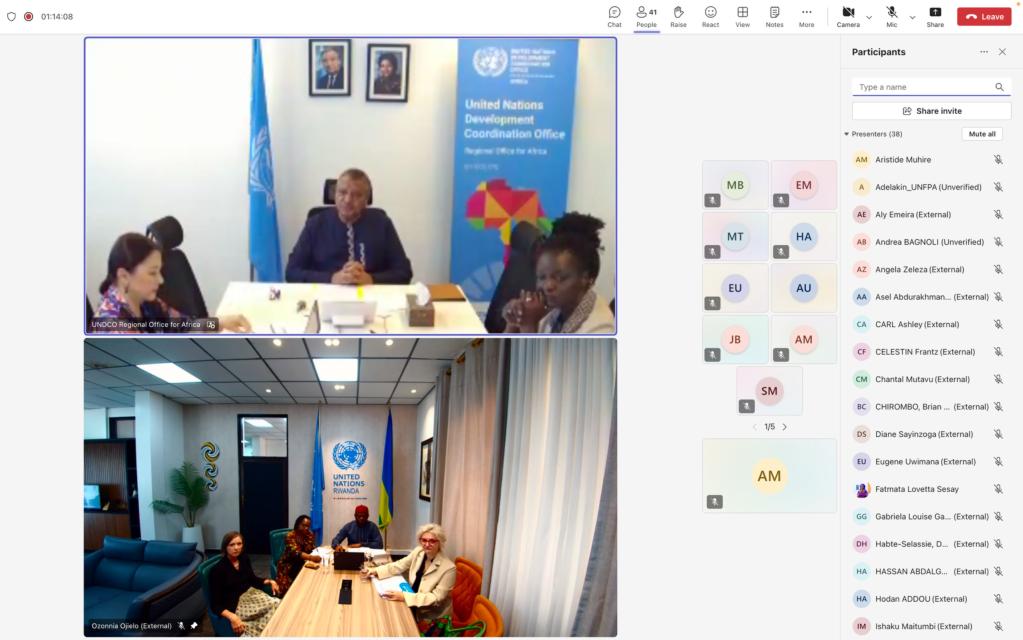
Press Release
20 May 2025
UN expert on poverty to visit Rwanda
Kigali – The UN Special Rapporteur on extreme poverty and human rights, Olivier De Schutter, will conduct an official visit to Rwanda from 19 to 30 May 2025 to examine the government’s efforts to eradicate poverty.During his two-week visit, the Special Rapporteur will visit the capital, Kigali, and travel across the country, including to the districts of Gisagara, Musanze and Nyamasheke, gathering first-hand information from individuals and communities living in poverty and meeting with government officials, international organisations, academic experts and representatives from non-governmental and civil society organisations.He will pay particular attention to the situation of groups disproportionately affected by poverty such as women, children, rural households, historically marginalised people, persons with disabilities and informal workers, examining the adequacy of government policies and social protection systems in protecting them from poverty, inequality and social exclusion.The expert will present his preliminary observations and recommendations at a press conference on Friday 30 May at 11:30am (local time) at the Ubumwe Grande Hotel (Mutara room, second floor), Plot 1306, KN 67 Street, Kiyovu Cell, Nyarugenge Sector, Kigali. Access will be strictly limited to journalists. To register, please contact Farhan Siddique, Assistant Human Rights Officer, OHCHR: farhan.siddique@un.org / +918797134890De Schutter’s final report on Rwanda will be presented to the UN Human Rights Council in June 2026.
1 of 5
Press Release
11 October 2023
Veteran Clubs World Championship - Rwanda 2024
A spirit that is reflected by the vibrant Tanzanian Premier League which makes it one of the most successful championships on the continent. The joint winning bid to host the 2027 Africa Cup of Nations together with other international events that will happen in the country is a demonstration of their bold ambition.
Following the cities of Berlin, London, Paris, New York, Dubai, and Lagos, Dar es Salaam was, therefore, an obvious stop of the LEGENDS VISIT RWANDA International tour with Jay-Jay Okocha as the special guest.
The presentation conference which took place at the Dar es Salaam Serena Hotel, was graced by the presence of the Rwandan High Commissioner to Tanzania, the United Nations Resident Coordinator in Tanzania, the Chairman of the Union of Tanzania Soccer Veterans, the Chairman of the Tanzanian football federation, the President of the VCWC business club as well as local business managers and major media houses from the country.
Following a welcome address from the VCWC Chairman, Ambassador Fatou Harerimana in her opening remarks renewed the commitment of the government of Rwanda towards ensuring that the VCWC inaugural edition in 2024 is a brilliant success.
The country has world-class facilities that have recently hosted several international events and the brand new Amahoro stadium will equally be ready next year to host the Legends' tournament.
Mr. RWABUKUMBA, President of the VCWC Business Club in his statement said: "The VCWC Business Club is a unique opportunity to ensure that this outstanding event bringing 150 football Legends to Rwanda, leaves a sustainable legacy at the regional (East Africa) and global level."
A presentation was then made by the technical team regarding the di erent VCWC communities which involve:
1- BUSINESS CLUB: This brings together investors, entrepreneurs, experts, and development partners willing to collaborate with Legends to address socio-economic opportunities.
2- MEDIA CLUB: This includes Journalists, Content producers, content creators, filmmakers and more. All are willing to share the story of the continuous impact of the Legends.
3- YOUTH CLUB: A network of existing youth communities with innovators, entrepreneurs, and advocates who are actively working to make a di erence in their communities.
4- AMATEUR CLUB: These are corporate football teams that will take part in an amateur tournament on the sidelines of the Legends tournament aimed at promoting a healthy lifestyle in the workplace and inter-organizational networking.
All the aforementioned opportunities are geared towards transforming the incredible audience that will be generated from such an event into tangible impact at the social, economic, cultural and environmental levels.
In his closing remarks Mr. Milišić said: "It is a wonderful project that will attract a global audience. We must therefore work hand in gloves to build sustainable partnerships with the Legends towards advancing the global goals."
Next Stop: Johannesburg in South Africa on the 13th of October 2023.
1 of 5
Press Release
15 February 2023
WFP increases food assistance for refugees in Rwanda
WFP’s monthly price monitoring indicates that the average cost of the food basket in December 2022 was 77 percent higher compared to December 2021. “The global rising costs of food, energy, and transportation is putting food out of reach for thousands of families and threatening to push them further into hunger,” says Ahmareen Karim, WFP’s acting Country Director in Rwanda. “This increased support will give refugees more choice to address their essential needs in local markets, while also helping to boost local economies.”
In May 2021, WFP introduced needs-based assistance for refugees in Rwanda – ensuring that limited resources are prioritized for the most vulnerable refugees. Currently, out of 127,000 refugees hosted in Rwanda, WFP provides food and nutrition assistance to 113,650 camp-based refugees, with 87 percent of all refugees classified as highly vulnerable and 6 percent as moderately vulnerable. Infants and young children, pregnant and breastfeeding women, people living with HIV and tuberculosis receive additional supplemental nutrition assistance to prevent and treat malnutrition. School children from refugee communities and children from host communities who attend the same schools also receive daily nutritious porridge or hot meals.
WFP works closely with the Government of Rwanda, UN partners and civil society organizations to contribute to the food security of vulnerable population groups, such as refugees and asylum seekers, despite the significant food price increases across the country.
UNHCR’s representative Aissatou Masseck Dieng-Ndiaye comments: “The increase of the value of food assistance for refugees comes at a critical time. Inflation, including in food prices, is making it harder for refugees to meet their basic needs. By working closely with WFP to identify the most vulnerable refugee populations, UNHCR hopes that this latest change will prevent refugees resorting to negative coping strategies and help them better support their families.”
WFP is currently supporting the recent influx of newly displaced persons from the Democratic Republic of Congo with life-saving in-kind food assistance in the Nkamira transit camp.
“The Government of Rwanda will continue to work with partners and stakeholders to ensure the well-being and full protection of hosted refugees and asylum seekers. The Government will also continue to ensure that all its pledges and commitment for refugee protection and inclusion are fulfilled in accordance with international conventions and national laws,” says Philippe Habinshuti, Permanent Secretary in the Ministry in charge of Emergency Management.
Follow us on Twitter @WFP_Africa, @AhmareenKarim, @UNRwanda, @RwandaEmergency, @RefugeesRwanda
For more information please contact:
● WFP Kigali: Sarah Colbourne,
Tel. +250 587611, Email: sarah.colbourne@wfp.org
● WFP Nairobi: Alessandro Abbonizio,
Tel. +254 723001639, Email: alessandro.abbonizio@wfp.org
● MINEMA: Claude Twishime,
Email: ctwishime@minema.gov.rw
● UNHCR: Lilly Carlisle,
Email: carlisle@unhcr.org
1 of 5
Press Release
20 January 2023
WFP welcomes funding from the United States to support refugees in Rwanda
“This contribution from the United States comes at a time when we need it most. With the recent arrival of over 100 new refugees every day from the Democratic Republic of the Congo and rising costs of food, energy and transport, refugees are now, more than ever in need of assistance to enable them to progress towards self-reliance,” says Ahmareen Karim, WFP’s Acting Country Director in Rwanda.
WFP uses cash transfers to empower people with choice to address their essential needs in local markets, while also helping to boost local economies.
Despite this generous funding, WFP is still not able to provide full rations to meet the minimum food requirements for refugees in Rwanda. WFP, in partnership with UNHCR, the UN Refugee Agency, introduced a needs-based targeting approach in May 2021 – a system under which refugees are given food rations according to their levels of vulnerability.
Due to funding shortfalls, the most vulnerable refugees currently receive 92 percent of a full ration and those deemed moderately vulnerable receive 46 percent of a full ration. This ensures that the most vulnerable refugees are prioritized for food assistance while the least vulnerable refugees are supported to become more self-reliant.
This contribution is in addition to US$9.5 million received from the United States in 2022 in support of WFP’s refugee operations in Rwanda.
# # #
The United Nations World Food Programme is the world’s largest humanitarian organization saving lives in emergencies and using food assistance to build a pathway to peace, stability and prosperity for people recovering from conflict, disasters and the impact of climate change. Follow us on Twitter @WFP_Africa
WFP uses cash transfers to empower people with choice to address their essential needs in local markets, while also helping to boost local economies.
Despite this generous funding, WFP is still not able to provide full rations to meet the minimum food requirements for refugees in Rwanda. WFP, in partnership with UNHCR, the UN Refugee Agency, introduced a needs-based targeting approach in May 2021 – a system under which refugees are given food rations according to their levels of vulnerability.
Due to funding shortfalls, the most vulnerable refugees currently receive 92 percent of a full ration and those deemed moderately vulnerable receive 46 percent of a full ration. This ensures that the most vulnerable refugees are prioritized for food assistance while the least vulnerable refugees are supported to become more self-reliant.
This contribution is in addition to US$9.5 million received from the United States in 2022 in support of WFP’s refugee operations in Rwanda.
# # #
The United Nations World Food Programme is the world’s largest humanitarian organization saving lives in emergencies and using food assistance to build a pathway to peace, stability and prosperity for people recovering from conflict, disasters and the impact of climate change. Follow us on Twitter @WFP_Africa
1 of 5
Press Release
08 December 2022
United Nations Rwanda and Veteran Clubs World Championship (VCWC), united for the success of VCWC Rwanda2024.
VCWC Rwanda2024 is an event that will bring together over 150 football legends to Rwanda, to take part in a tournament and series of forums aimed at using the influence of sports as a driver of the UN Sustainable Development Agenda 2030.
On the heels of the LEGENDS IN RWANDA international kickoff that will take place in Doha (Qatar) on the 16th of December 2022, VCWC will undertake a series of national and international events in 12 cities around the world with the football legends culminating in the big jamboree in Kigali. This tour will engage with key stakeholders from the Governments, UN, Development Partners,Private Sectors, and civil society Organisations to ensure active and effective participation at the 2024 rendezvous.
INFONLINE/UNRCO
0786976708
Immy.mulekatete@undp.org
https://rwanda.un.org/
INFONLINE/VCWC
(+250) 790336142
info@vcwc2024.com
www.vcwc2024.com
1 of 5
Latest Resources
1 / 11
Resources
03 November 2024
1 / 11

